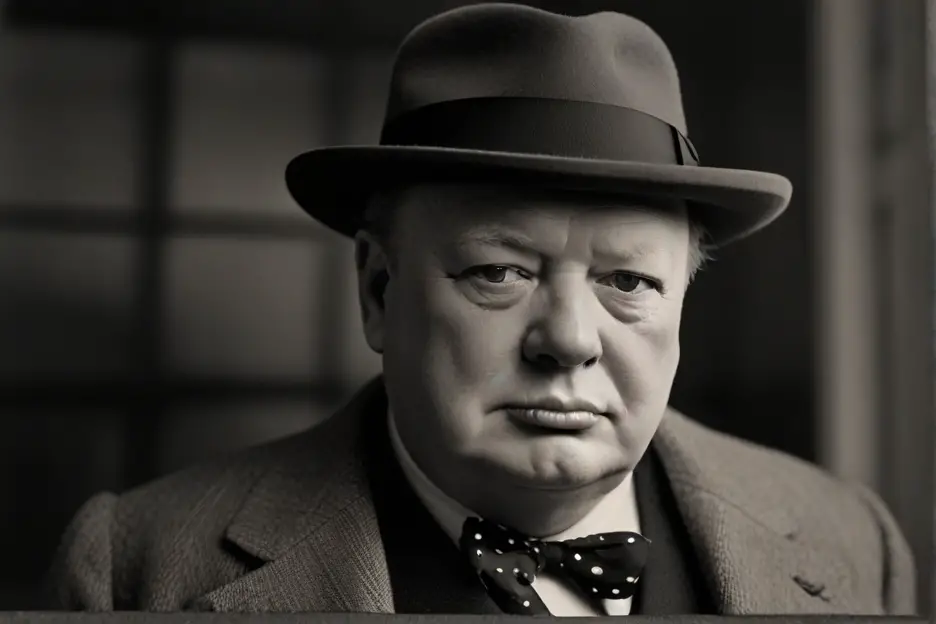
Winston Churchill, the former Prime Minister of the United Kingdom, played a significant role in shaping the course of history during the Cold War era.
His leadership and oratory skills made him a prominent figure in international politics, and his speeches and writings continue to influence global events to this day.
In this article, we’ll explore Churchill’s role in the Cold War, from his famous Iron Curtain speech to his later stance on the conflict, and examine the lasting legacy of his leadership.
The Iron Curtain Speech (1946)
Churchill’s Iron Curtain speech, delivered on March 5, 1946, at Westminster College in Fulton, Missouri, is considered one of the most important speeches of the 20th century.
In it, Churchill warned of the dangers of Soviet expansionism and the need for a united Western response to counter the threat.
The speech was a call to action, urging the United States and other Western nations to stand together against the Soviet Union’s aggressive policies.
- Read also: Understanding the Differences: World War I Vs World War II
- Read also: Beyond the Battlefield: Unsung Heroes of the Revolutionary War
The speech’s content
- Churchill highlights the stark difference in political systems between Western democracies and the Soviet communist regime.
- He describes a line drawn across Europe, from Stettin in the Baltic Sea to Trieste on the Adriatic, an “iron curtain” that has descended, effectively dividing the continent.
- He warns of Soviet expansionist aims and calls for a united front between the United States and Britain (“the special relationship”) to preserve peace and freedom in Europe.
Impact
- Coining a term: “Iron Curtain” becomes a widely used term to describe the ideological division of Europe during the Cold War. It captured the image of a closed-off, unfree Soviet bloc.
- Shifting public opinion: The speech significantly influenced public opinion in the West, raising awareness of the Soviet threat and garnering support for a more assertive stance against communism.
- Cold war catalyst: Many historians see the Iron Curtain speech as a defining moment in the Cold War, marking a shift from wartime cooperation to a period of suspicion and rivalry.

Churchill’s Later Stance on the Cold War (1950s)
In the 1950s, Churchill continued to speak out against Soviet aggression, advocating for a strong NATO alliance and a robust defense policy.
He also played a key role in the development of the European Economic Community (EEC), which would later become the European Union.
Churchill’s leadership during this period helped to cement the United States’ commitment to European security and stability.
Shifting strategies
From confrontation to negotiation
Initially advocating for a robust military stance as a deterrent against Soviet aggression, Churchill recognized the pitfalls of an escalating arms race.
He understood the need for alternative approaches to address the growing tensions between East and West.
Summit meetings
Churchill championed the idea of summit meetings between Western and Soviet leaders.
He believed that direct personal interaction could foster understanding, alleviate distrust, and pave the way for meaningful negotiations.
These high-level conferences represented a departure from purely antagonistic tactics towards a more diplomatic approach to conflict resolution.
Controversial proposal
One of Churchill’s most controversial proposals was the concept of a reunified, neutralized Germany.
Despite facing criticism for potentially emboldening the Soviets and weakening Western defenses, Churchill saw a neutral Germany as a strategic asset.
He believed that a neutralized Germany could serve as a buffer zone, easing tensions between East and West and potentially bridging the ideological divide.
Legacy of Churchill in the Cold War

Winston Churchill’s influence on the Cold War era is profound and multi-faceted.
As a leader during World War II, his steadfast resolve and advocacy for a strong Western response to Soviet expansionism played a pivotal role in shaping the trajectory of the Cold War.
Leadership in World War II
Churchill’s leadership during World War II established him as a towering figure on the world stage.
His unwavering determination and strategic vision helped to rally the Allied forces against the Axis powers, ultimately leading to victory in the war.
Advocacy for western response
Churchill’s speeches, notably his “Iron Curtain” address, resonated deeply with both the public and policymakers.
By highlighting the threat posed by Soviet aggression and calling for a united Western front, Churchill galvanized support for a robust response to communist expansionism.
Enduring influence
Churchill’s words continue to reverberate in the halls of history and influence contemporary discourse.
His speeches, characterized by eloquence and clarity of purpose, are studied and referenced by historians and policymakers seeking insight into the challenges of the Cold War era.
Inspiration for future leaders
Churchill’s unwavering commitment to democracy and freedom served as a beacon of hope for generations of leaders.
His leadership style and principles inspired leaders like Ronald Reagan, who often invoked Churchill’s legacy as they navigated their own challenges in the Cold War landscape.
- Read also: A Comprehensive Guide to Ultimate General: Revolutionary War
- Read also: Legacy of Power: Best 5 Sultans of the Ottoman Empire
Conclusion
Winston Churchill’s leadership during the Cold War era was marked by his unwavering commitment to democracy and freedom.
His speeches, including the Iron Curtain address, continue to be celebrated for their eloquence and insight.
Churchill’s legacy in the Cold War is a testament to his enduring influence on international politics and his role as a champion of Western values.
FAQs
The Iron Curtain speech was a call to action, urging the United States and other Western nations to stand together against Soviet expansionism. It marked a turning point in the Cold War, as Churchill’s words helped to galvanize a united Western response to the Soviet threat.
Churchill played a key role in the development of NATO, advocating for a strong alliance to counter the Soviet threat. His leadership helped to cement the United States’ commitment to European security and stability.
Churchill supported the development of the EEC, which would later become the European Union. He believed that economic integration was key to European stability and prosperity.


